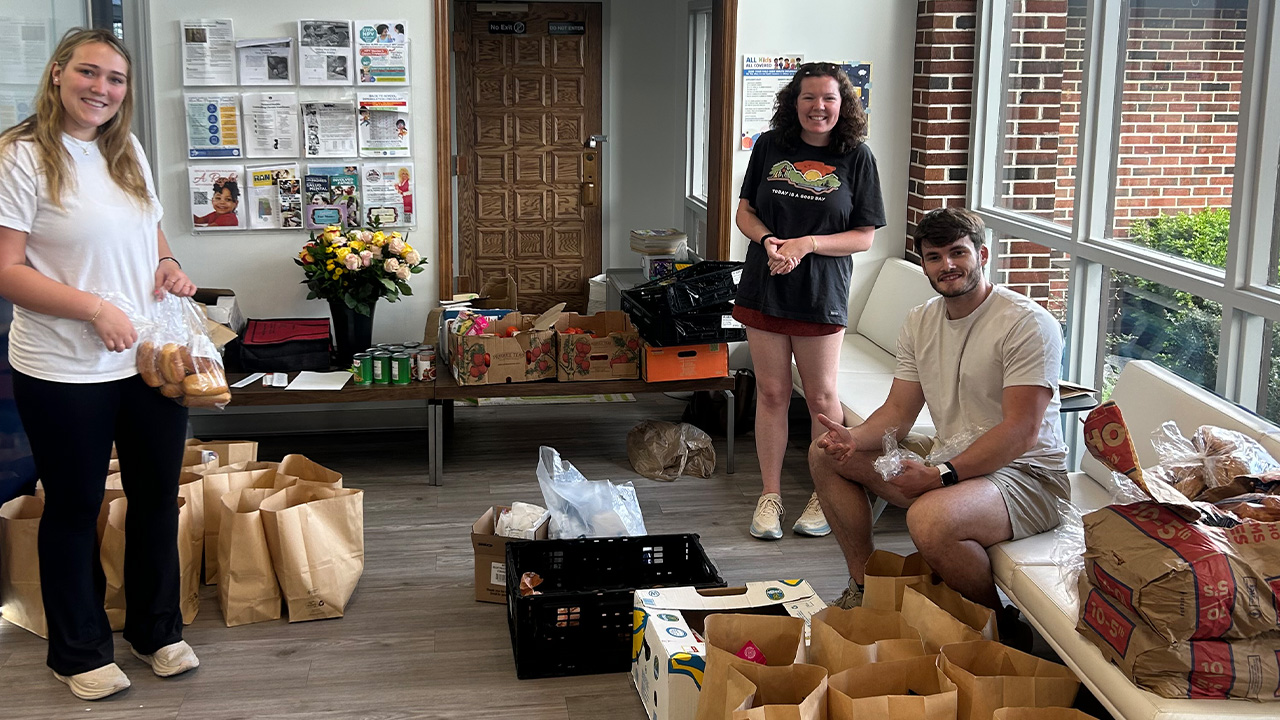content body

Rural Health Connect student volunteers have hosted community gatherings, including mental health and healthy food fairs.
Extended wait times, long drives to facilities and a lack of resources are challenges that limit access to health care in rural communities across the United States. But in one rural Alabama county, Auburn students planning to enter the medical and health fields are hoping to break down these barriers.
The Auburn University Rural Health Initiative is kicking off Rural Health Connect (RHC), its newest student led organization, in the fall. It is open to both undergraduate and graduate students and currently has 24 students serving on its executive board.
Corinne DuMond, a senior majoring in health care administration and the vice president of public relations for RHC, is optimistic that engaging students with rural communities is a step toward improving health care across Alabama.
“We’re really hoping this partnership will encourage meaningful connections for both our students and our community partners in Chambers County,” she said. “We’re excited to see how this will benefit the students, the community and health outcomes as a whole.”
“I strongly believe that no one’s ZIP code should determine whether they get the chance for early intervention.”
Community challenges
Alabama has a disproportionately high rate of cervical cancer when compared to the rest of the United States, according to the Alabama Department of Public Health, and Chambers County has one of the highest rates in the state.
“Cervical cancer is curable if detected early, yet the mortality rate from it is staggeringly high in rural Alabama,” DuMond said. “That’s a problem, and it needs to change.”
The program, along with the Rural Health Initiative as a whole, aims to help address this gap in coverage and inform communities about preventative measures that can be taken to avoid this diagnosis.
“Chambers County isn’t far from Auburn, yet they have some serious health deficits,” DuMond said. “It’s sad, because they’re so close to a big university that can help with that.”
Partnerships with purpose
As part of the program, students will be paired with community members in Chambers County and serve as their health partners, helping them achieve their health goals.
“They’ll do anything a really good neighbor would do,” said Kate Bouchillon, the organization’s advisor and a graduate of the College of Sciences and Mathematics. “Whether that’s helping them make a grocery list or driving them to appointments, our students are here to support community members on their health journey.”
Want to join the next generation of changemakers in expanding access to rural health care?
Apply to become a Health PartnerStudents are trained to assist community members to meet a variety of health goals they may have, such as exercising more, eating healthier or even building friendships. Students will conduct monthly visits and weekly phone check-ins with their community partners to provide support.
Beyond serving as health partners, the students will also host community health events.
Past events hosted by the Rural Health Initiative include mental health and healthy food fairs, community walks and a dementia screening program led by RHC’s vice president of finance, Brian Kim.
Creating changemakers
Kim, a senior majoring in biomedical sciences on the pre-medicine track, started the initiative with his sister Amy, an incoming first-year student, after losing their grandfather to Alzheimer’s disease.
“By the time he was diagnosed, it was already too late — and despite searching for clinical trials and second opinions, we were told there was nothing more we could do,” Kim said. “After his funeral, I searched for memory screening services near Auburn and was shocked to find that the closest option was over an hour away in Montgomery.”
Kim, along with other volunteers who are certified in the Montreal Cognitive Assessment (MoCA), have screened over 170 seniors across rural Alabama. Most had never received a formal cognitive screening, a key aspect of early detection and treatment.
“Rural communities like those in Alabama are often overlooked,” Kim said. “More than 87% of Alabama’s counties are medically underserved, and on top of that, transportation barriers, lower health literacy and high poverty rates make access even harder. These challenges often delay diagnosis until treatment options are limited.
“I strongly believe that no one’s ZIP code should determine whether they get the chance for early intervention.”
RHC hopes to instill this commitment to health equity in future health care professionals and leaders.
“It’s amazing that we can teach students about health equity and what it means to be understanding and compassionate before they even enter the field,” DuMond said. “I really think it’ll change health care in Alabama, and hopefully one day beyond.”






